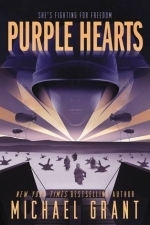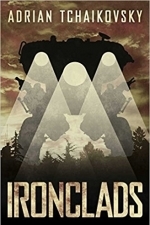Hazel (1853 KP) rated Purple Hearts in Books
Oct 24, 2017
An epic tale of a reimagined World War II comes to an explosive end in this third and final book Purple Hearts. Michael Grant created an alternative history in which women were allowed to enter the army and fight alongside the men on the front lines in Europe. Having earned accolades, promotions and the right to go home to America at the conclusion of the previous book, Rio, Frangie and Rainy decide to stay for the remains of the war. It is 6th June 1944, and the battle on the sands of Omaha Beach is about to begin – D-Day.
The story rushes into the horrors of the D-Day landings where Rio, now a Sergeant, is leading her platoon through the treacherous battleground, whilst Frangie, the medic, tries to patch up fallen comrades. The author teases the reader with the introduction of new characters who promptly get killed during this fateful day and battles further along the line. There is no sugar coating the horrific experience of soldiers and civilians, regardless of whether the scenes are fictionalized or not.
The difficulty with writing a work of fiction about the final years of World War II is that the majority of readers will already know the facts. Therefore, it was impossible for Grant to compose a drastic alternative history. Despite the inclusion of women soldiers, the main events occur exactly as they did in reality, beginning with D-Day before moving on to Liberated France, the Hürtgen Forest, the Battle of the Bulge, and, eventually, VE Day.
The three main characters have undergone complete transformations since the beginning of book one. No longer are they the innocent girls mocked for the belief they could be as strong as male soldiers. As horror after horror unfolds, readers are left with only the hope that these three survive.
Throughout book one and two, the narrative was interspersed with a commentary from an anonymous female soldier in a bed at the 107th evacuee hospital in Würzburg, Germany. As promised at the beginning of the series, readers finally find out which character this nameless voice belongs to, although it is dragged out until the final pages of the book.
The title, Purple Hearts, refers to the medal earned by soldiers injured in battle. Rio, Frangie and Rainy have each received one, along with a few other characters. Unfortunately, many are killed in the battles, some who have been in the story from the start, making this an extremely shocking book. It goes to show how dangerous war is and the brutality WWII soldiers experienced. It is a surprise that as many survived as they did.
Although at this point the main focus of the story is the war, there is still the underlying theme of equality, both for women and for black people. Frangie provides the insight into the segregation of blacks, being assigned to black-only patrols and having white patients refuse to be treated by her. However, as the war gets more violent, these lines get blurred until it is (mostly) no longer important the colour of a soldier or medic’s skin.
Purple Hearts is a brilliant end to a challenging series. Readers become invested in the characters and are drawn into a story that is so true to form that it is easy to forget that women did not actually take part in the fighting. Evidently well researched, Michael Grant has penned a series that educates whilst it entertains, opening readers’ eyes to the truth about war. This is nothing like a textbook full of facts and figures, it is a moving, personal (forget the fictional bit) account of what WWII was really like. Written with young adults in mind, this is a great series for both teens and older readers.
Hazel (1853 KP) rated Purple Hearts in Books
Dec 7, 2018
An epic tale of a reimagined World War II comes to an explosive end in this third and final book <i>Purple Hearts</i>. Michael Grant created an alternative history in which women were allowed to enter the army and fight alongside the men on the front lines in Europe. Having earned accolades, promotions and the right to go home to America at the conclusion of the previous book, Rio, Frangie and Rainy decide to stay for the remains of the war. It is 6th June 1944, and the battle on the sands of Omaha Beach is about to begin – D-Day.
The story rushes into the horrors of the D-Day landings where Rio, now a Sergeant, is leading her platoon through the treacherous battleground, whilst Frangie, the medic, tries to patch up fallen comrades. The author teases the reader with the introduction of new characters who promptly get killed during this fateful day and battles further along the line. There is no sugar coating the horrific experience of soldiers and civilians, regardless of whether the scenes are fictionalized or not.
The difficulty with writing a work of fiction about the final years of World War II is that the majority of readers will already know the facts. Therefore, it was impossible for Grant to compose a drastic alternative history. Despite the inclusion of women soldiers, the main events occur exactly as they did in reality, beginning with D-Day before moving on to Liberated France, the Hürtgen Forest, the Battle of the Bulge, and, eventually, VE Day.
The three main characters have undergone complete transformations since the beginning of book one. No longer are they the innocent girls mocked for the belief they could be as strong as male soldiers. As horror after horror unfolds, readers are left with only the hope that these three survive.
Throughout book one and two, the narrative was interspersed with a commentary from an anonymous female soldier in a bed at the 107th evacuee hospital in Würzburg, Germany. As promised at the beginning of the series, readers finally find out which character this nameless voice belongs to, although it is dragged out until the final pages of the book.
The title, <i>Purple Hearts</i>, refers to the medal earned by soldiers injured in battle. Rio, Frangie and Rainy have each received one, along with a few other characters. Unfortunately, many are killed in the battles, some who have been in the story from the start, making this an extremely shocking book. It goes to show how dangerous war is and the brutality WWII soldiers experienced. It is a surprise that as many survived as they did.
Although at this point the main focus of the story is the war, there is still the underlying theme of equality, both for women and for black people. Frangie provides the insight into the segregation of blacks, being assigned to black-only patrols and having white patients refuse to be treated by her. However, as the war gets more violent, these lines get blurred until it is (mostly) no longer important the colour of a soldier or medic’s skin.
<i>Purple Hearts</i> is a brilliant end to a challenging series. Readers become invested in the characters and are drawn into a story that is so true to form that it is easy to forget that women did not actually take part in the fighting. Evidently well researched, Michael Grant has penned a series that educates whilst it entertains, opening readers’ eyes to the truth about war. This is nothing like a textbook full of facts and figures, it is a moving, personal (forget the fictional bit) account of what WWII was really like. Written with young adults in mind, this is a great series for both teens and older readers.
I have read Adrian Tchakovsky's Shadows of the Apt series and loved it.
I recently read his Dogs of War and enjoyed it. However I think this has somewhat tainted Ironclads for me.
Ireonclads sees us again in the near-future where the UK (read as England which annoyed me, being Scottish) has gained independence from Europe and subsequently gone bust and been bought over by the USA. The USA is likewise invading or at war with much of the rest of the world. These wars are now fought mainly in corporate interest (but then what's new *cough gulf war cough*) with armies of poorly equipped government soldiers being dent in to conflict occasionally supported by corporate playboys (generally the heir to the corporate fortunes) in their massive armoured scion suits (hence iron-clad) where they are fully protected from pretty much everything. These playboys tend to be captured by each other and ransomed back to their families, guffawing at their japes all the way.
The story sees one small group of US soldiers sent in to deepest darkest Sweden to rescue one such playboy who got himself too far ahead of the army and appears to have gone missing but without ransom (without his scion suit).
Being a short (200 pages) book worked well for me, I felt any more scenes or narrative would have felt like padding and this was its natural length.
However, for me this book felt like the notes or background story to Dogs of War and has suffered from my having read the latter. That book notes that wars used to be fought with machines and robots but moves on to cybernetically enhanced animals. This book felt like a side story or introduction to the Dogs of War world and little more.
Other aspects of the story chimed with that of Dogs of War as well and showed the author to be a little short of ideas - living beings with their brains/bodies cybernetically enhanced, swarms of insects used to disrupt communications, the USA being a little bit invadey and corrupt etc.
While this is not my usual cup of tea, I have enjoyed other sci-fi and felt this was a little slapdash. I didn't like the narrative style, finding the blasé, informal tones of the army sergeant both jarring and poorly executed. And while I don't need to be spoon-fed the plot, I found some elements badly or barely explained (what DID the Finns do?!) and the major plot twist neither surprising nor worth the wait.
Tchaikovsky can describe a battle scene well and you get a feel for the whole battle as well as the key conflicts, so the action itself is fairly gripping at times. However, the finished article left me feeling a bit meh.
All in all I am glad I read this, but had expected better things from his sci-fi given Children of Time won the Arthur C Clarke award.
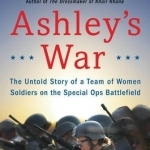
Ashley's War: The Untold Story of a Team of Women Soldiers on the Special Ops Battlefield
Book
In 2010, the Army created Cultural Support Teams, a secret pilot program to insert women alongside...

Rage of the Righteous
Games
App
Welcome to Rage of the Righteous, an exciting action-combat MMO game! Assume the role of a new...
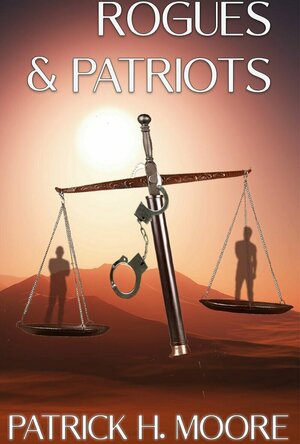
Rogues & Patriots (Nick Crane #2)
Book
In the Depths of Corruption… In the Face of Tyranny… One Man's Quest Begins… Get ready...
PI Thriller

Eastman Was Here
Book
“Absorbing...Eastman is a riveting...presence who demands to be loved and remembered.” —The...
Fiction
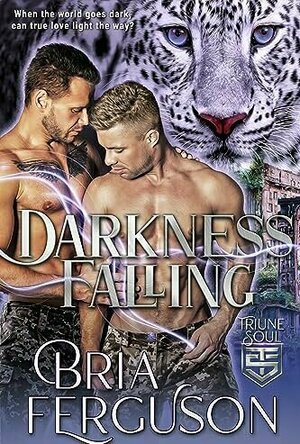
Darkness Falling (Light Up the Dark, #1)
Book
When the world goes dark, can true love light the way? Lex I seem like the luckiest witch in...
Paranormal Post-Apocalyptic MM Romance
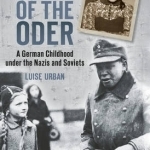
East of the Oder: A German Childhood Under the Nazis and Soviets
Luise Urban and Eva Wood
Book
Luise Urban was born in 1933 into a world about to be turned upside down. Her family lived east of...
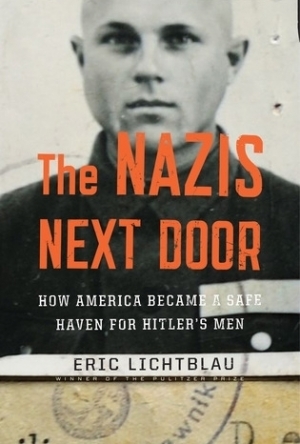
The Nazis Next Door: How America Became a Safe Haven for Hitler's Men
Book
The shocking story of how America became one of the world’s safest postwar havens for Nazis ...
